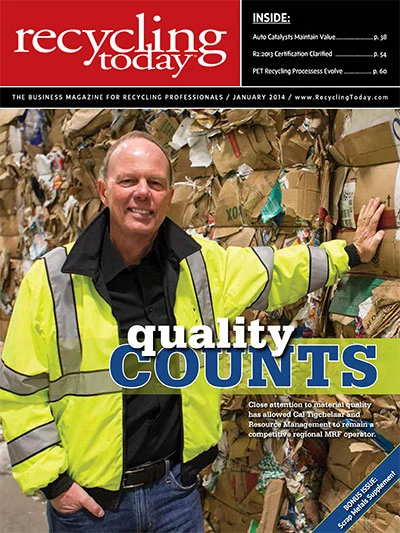 Lights, copper, action
Lights, copper, action
Companies worldwide are dedicated to recycling just about everything; from metal, paper and plastic to electronics, textiles and even Christmas tree lights. In Adam Minter’s new book Junkyard Planet: Travels in the Billion Dollar Trash Trade, the son of a Minnesota scrap yard owner describes how the southern Chinese town of Shijiao started recycling copper from America’s old holiday lights, according to a Nov. 13, 2013, NPR article, “Christmas lights make slippers in global junk yard economy.”
Minter tells NPR that Christmas tree lights are an ideal basic commodity for Chinese scrap recyclers to bring in, despite copper making up only about 28 percent of a load of lights.
“In the United States, where there’s a lot of recycling of copper wire, the American recyclers prefer to recycle wire and cable that was generally more than 80 percent copper. So what they’ll do is export this stuff to China, where there’s huge demand for copper,” Minter tells NPR.
About 43 percent of the global copper demand is in China, he adds.
In Junkyard Planet, Minter profiles a recycling plant in Shijiao that recycles the insulation off of Christmas tree lights, which is then transformed into slipper soles.
“They’ll shred the Christmas tree lights and they’ll use a system that, basically … uses water to float out the insulation and it will be collected and they’ll sell it to a slipper sole manufacturer,” Minter says.
For more information, visit Minter’s website at www.shanghaiscsrap.com.
Recycle row
The city of Boulder, Colo., has completed its decade-long “Recycle Row” concept after Eco-Cycle and its Center for Hard-to-Recycle Materials (CHaRM) moved to 6400 Arapahoe Ave. Eco-Cycle, a nonprofit recycler, says the new location is easier to find and closer to other zero-waste facilities.
For 33 years, Eco-Cycle worked out of its facility on Old Pearl Street, not too far from its new location. The recycler opened CHaRM in 2001, and it is the first facility of its kind in the nation, Eco-Cycle says. The facility recycles electronics, books, toilets, bubble wrap, Styrofoam, cooking oil, yoga mats and numerous other unusual materials. CHaRM also accepts single-stream recycling, compost materials and scrap metal with or without Freon.
While the street is not named Recycle Row, the 1.2-mile stretch from 63rd Street and Valmount down to CHaRM’s new site is home to every current zero-waste facility in town, according to Eco-Cycle. Next door to CHaRM is Resource, the city’s nonprofit retailer of new and used building material.
Residents can drop off traditional recyclables around the corner on 63rd Street at the Boulder County Recycling Center and also can leave hazardous materials at the Boulder County Hazardous Material Management Facility next door. At the end of Recycle Row, the Boulder County/City of Boulder Yard Waste and Wood Waste Drop-Off Center completes the stretch of zero-waste facilities.
“This process began over a decade ago,” says city of Boulder Environmental Action Project Manager Kara Mertz. “The city of Boulder wanted to create ‘Recycle Row,’ a place where all zero waste facilities were as close to each other as possible to make it convenient for residents and businesses to take care of all their recycling and reuse needs in one place. Moving Resource three years ago and now CHaRM brings two vital community programs into this area.”
Mertz says CHaRM’s move is important to the city’s Zero Waste Master Plan with Eco-Cycle, which is committed to diverting 85 percent or more of its waste from landfill.
Eco-Cycle’s former Executive Director Eric Lombardi says the company looks forward to future innovations in resource conservation. “Here’s to a future of carpet recycling, mattress recycling, and who knows what else,” Lombardi says.
For more information about Recycle Row, visit www.ecocycle.org/recycle-compost-reuse/maps.
 Drink pouch brigade
Drink pouch brigade
Since 2007, the international recycling and upcycling company TerraCycle, Trenton, N.J., has partnered with Capri Sun to collect and recycle the laminated aluminum foil beverage pouches through the Drink Pouch Brigade. The nationwide campaign has diverted more than 200 million drink pouches from landfills and has donated nearly $4 million to schools and charities, according to TerraCycle.
For each piece of waste returned, participants earn points toward gifts or cash donations to schools or charities of their choice. The program is free, and all shipping costs are paid.
To celebrate communities recycling millions of pouches, Capri Sun has announced a significant increase in prizes and benefits for participants in the new Drink Pouch Brigade Milestone program.
In addition to earning points for each piece of waste collected, participants now have the chance to win recycled products, including a park bench and a playground made entirely from recycled drink pouches, the company says.
Terracycle has made various products from recycled Capri Sun pouches, such as backpacks, purses, wallets, totes and pencil cases.
For more information about the Drink Pouch Brigade Milestone campaign, visit www.terracycle.com/brigades.
Do you have a unique recycling-focused story? Please send a press release to Megan Workman at mworkman@gie.net.

Explore the January 2014 Issue
Check out more from this issue and find your next story to read.
Latest from Recycling Today
- Aqua Metals secures $1.5M loan, reports operational strides
- AF&PA urges veto of NY bill
- Aluminum Association includes recycling among 2025 policy priorities
- AISI applauds waterways spending bill
- Lux Research questions hydrogen’s transportation role
- Sonoco selling thermoformed, flexible packaging business to Toppan for $1.8B
- ReMA offers Superfund informational reports
- Hyster-Yale commits to US production





